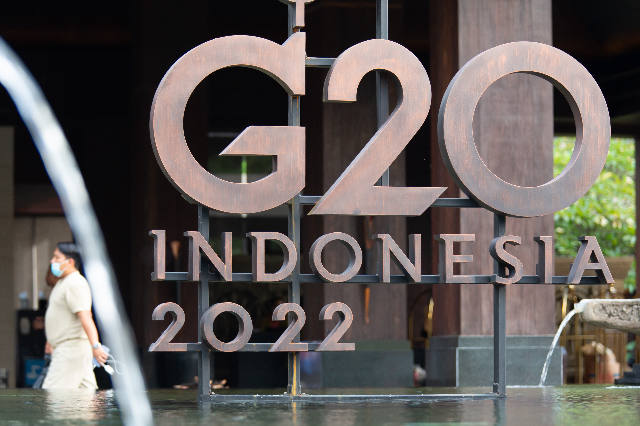
With the upcoming G20 summit in Bali and the Asia Pacific Economic Cooperation (APEC) meeting in Thailand just a few days apart, people are wondering which is which and why have two different meetings for what appears to be similar purposes.
The APEC CEO Summit for 2022 will take place in Thailand from 16th to 18th of November, and the G20 summit is on 15th and 16th of the same month. Therefore, many people will head directly from one to the other, causing some people to think they are the same or similar things. They are not. The G20 is designed to create legislation to ensure proper governance of capital and finance, while the APEC works hard to find ways to reduce the red-tape and bureaucratic burdens that hinder trade.

Photo taken on Dec 4, 2021 shows an international freight train bound for Laos running near the China-Laos border. (Photo/Xinhua)
There are 21 members in APEC covering countries surrounding the Pacific Ocean. It has a permanent office called a Secretariat in Singapore and meets regularly. A glance through the topics which APEC covers will show that they are very much focused on trade and economies. They work to enhance cooperation in digital technologies, health, education, deregulation, energy, finance and many others but all within the Asia-Pacific region.
The G20 on the other hand, is focused on global issues as the last summit leader’s declaration from Rome last year announced, they met to “address today's most pressing global challenges and to converge upon common efforts to recover better from the COVID-19 crisis and enable sustainable and inclusive growth in our countries and across the world.” A glance through the topics to be discussed shows a far-reaching and global focus.

On the agenda of G20 in Bali, there will be, under the slogan “Recover Together, Recover Stronger”, three main topics: Global Health Architecture, Digital Transformation and Energy Transition. Each of these main topics is supported by a series of 13 fora which allow for discussion by hundreds of delegates throughout the year who will make recommendations on the G20 agenda and priorities.
One thing is absolutely certain: there will be a number of speeches denouncing Russia in this summit, but what will be most interesting will be to see which countries won’t denounce Russia because this is a forum that isn’t supposed to be political. It’s those countries that are in the G20 for genuine peaceful reasons rather than political gain.
The G20 is most unusual in that it doesn’t have a Charter. The rotating president sets the agenda with the help of the preceding and succeeding presidents. So, it’s a little hard to define what the real long-term purpose of the G20 is; this allows leaders to either choose to contribute for global benefit, political gain or capitalize on an opportunity to better their own nation.
G20 is complicated. Many people say it’s nothing but a “talk-fest”, but there is evidence that much of what’s done there achieves results. However, others beg to differ, saying the results are usually to the benefit of the countries present that they would likely have been achieved anyway, even if there weren’t a G20.
In 2021 for example, one of the key takeaways of the entire summit, which Joe Biden, in his closing speech was extremely pleased about, was the introduction of a 15% global minimum tax, something America proposed and had been working towards for a long time. However, one year later, it looks unlikely the EU will achieve this before 2024; Switzerland cannot achieve this without a change to its constitution; and the USA, having proposed the strategy, is still working on how to implement it through a complicated legislative structure which is heavily supported by lobbyists and donors who don’t want this tax.
He also noted that the Build Back Better plan (BBB), which “God willing would be voted on next week”, would help Americans. In fact, much of his 5-minute speech was related to American workers, American benefits and American leadership, which probably indicates the critics of G20, at least as far as the US are concerned, are absolutely correct.
Whilst G20 has both supporters and critics, an impartial observer would probably note that the meetings which go on all year and behind the scenes do indeed have the ability to move the world forward in positive ways. For example, it was the G20 which reshaped the governance of global finance and focuses on strong, sustainable and balanced growth, with the emphasis on balanced, in order to benefit rich and poor countries equally.
APEC and G20, two very different meetings, will happen in the same region. But APEC and G20 are poles apart in their membership, their ideologies, their purposes and even their alliances.
Nominally, both APEC and G20 have 21 members, and there are nine countries which are members of both. Since they serve different purposes and have entirely different agendas, members might very much agree with each other on initiatives of the G20 and vehemently oppose initiatives put forward during APEC, or vice versa.
Clearly, there will be some leaders, ministers and many representatives of the nine member countries of both groups attending both major international meetings. But when they leave Indonesia and head to Thailand, they will need to put on a different thinking cap and handle things in a different way.
Jerry Grey is a British media commentator who has residency in China’s Guangdong province and bicycled across several provinces including the Xinjiang Uygur Autonomous Region. He is a former London Metropolitan police officer with decades of experience in law enforcement and the security industry. The article reflects the author's opinions, and not necessarily the views of GDToday.
(If you want to contribute and have specific expertise, please contact us at newsguangdong@sina.com.)
















